Who is God? How can we know God? Are the Hindus right? What about the Christians, or the Buddhists? And how do we know the right answer to any of these kinds of questions? People, especially those involved in the New Age movement like I used to be, think about this question quite frequently.
Things all changed for me the minute I came into the presence of Jesus Christ and entered into a real, personal relationship with the personal creator of the universe. His spirit entered into me and authenticated to me the truth about who God really is: The personal, transcendent, loving Creator we find revealed in scripture and the person of Jesus.
The idea of “God” in the New Age movement varies from person to person and teacher to teacher, but one unfortunate thing remains the same. Even if we leave questions about Christianity and scripture aside, these ideas don’t hold water for a minute on their own merits when put under philosophical scrutiny.
In fact, we don’t even have to grant that Christianity is true in order to know that these New Age concepts of God fail on the grounds of coherence. This article will read and feel more like an essay because its purpose is to be thorough and exhaustive.
With that being said, let’s look at 10 false New Age ideas taught by people such as Deepak Chopra, Eckhart Tolle, and even Oprah Winfrey and see if they hold up.
1. “God is indescribable.”
An idea that gets passed around is that God is simply way beyond what we can think about, and therefore any discussions about God are meaningless or futile. This is usually reinforced alongside a mystical philosophy of transcending the faculties of the mind to connect with a realm of pure being that is beyond thought.
There is a common misunderstanding that just because the infinite nature of God’s qualities extends beyond what we are able to fully comprehend means that God Himself as a being cannot be apprehended. We can apprehend the idea of an all-knowing being. We can grab hold of this idea, but we can’t fully fathom the infinite scope of having infinite knowledge.
Just because we cannot grasp the scope of being all-knowing does not mean we cannot apprehend the idea of an all-knowing being. Just because we can’t comprehend the scope of God being sovereign over everything does not mean we can’t apprehend an all-powerful being.
The difference here lies between the words “comprehension” meaning to fully grasp with the mind, and “apprehension” which means to grasp the mere idea of something. We might not be able to fully comprehend the infinite goodness, magnitude, and power of God, but we can certainly apprehend God as having these properties.
Secondly, it’s a fallacy to think that just because we can’t describe God fully means that we can’t describe God at all.
Furthermore, by calling God “indescribable” we are actually describing God! “God is indescribable” actually ascribes a description to God, namely that God cannot be described. This gives us an attribute of God.
This makes this point self-defeating, because you have to describe God in order to establish He is indescribable. You would have to further describe God to explain why He is indescribable in the first place (that he is fully transcendent, incomprehensible in magnitude, etc).
Contrary to being a stepping stone into Eastern Mysticism, this idea of an indescribable God defeats itself before it can even get off the ground.
2. “God is life force energy or prana.”
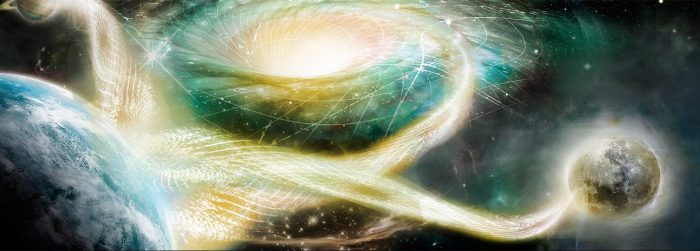
In some Eastern philosophies, God is described as being nothing more than “life force energy”, the aliveness that permeates our cells and flows through the energy systems of our body and all of nature. This has leaked its way into the New Age movement and dominates New Age theology today. As Eckhart Tolle writes:
“THROUGH THE PRESENT MOMENT, YOU HAVE ACCESS TO THE POWER OF LIFE ITSELF, THAT WHICH HAS TRADITIONALLY BEEN CALLED “GOD.” (1)
Let us grant, for the sake of argument, that such a life force energy really does exist. A universal life force within and without each one of us.
This brings us to two extremely major ideas that are really important to grasp. These are two extremely helpful ideas in being able to distinguish between God Himself and the false labeling of things as being God. The first one is simply this: What makes this God?
Yes, our cells have a certain aliveness and everything in nature has a kind of energy field component to it’s being (whether via electromagnetism, the electrical spin of subatomic particles, life energy, etc.), but why label this as being God? There has to be some positive reasons to suggest that God is nothing more than the energy of life, rather than simply asserting this natural force is God.
NATURAL SCIENCE HAS GOT IT RIGHT HERE. IF YOU WERE TO DETECT THE ENERGY OF THE EARTH FOR THE FIRST TIME AND TELL YOUR COLLEAGUE “THE ENERGY COMING FROM THE EARTH IS GOD”, THEY WOULD LOOK AT YOU LIKE YOU HAVE TWO HEADS.
Or if detected the human energy field and told your colleague “I detected God today, it’s my own energy field”, you would have some serious explaining to do. Or if you said “God is the life force inside this water molecule”, or “I discovered today that God is really just the sea of energy in the vaccuum of space”. Your colleagues would rightly ask you, why in the world are you labeling this function of nature as being God when we already know what it is?
There is a big difference between saying God created life or upholds life in some way, and saying that God is nothing more than the energy of life.
The second major problem here is that this definition of God can also apply to an atheistic universe in which nothing beyond nature exists.
We could hypothetically be living in a world where there is nothing beyond the physical reality and this concept of “God” as being the energy of life would not be affected a single bit. In fact, the universe could have arose out of nothing, by nothing, and life could have formed from dead inert matter from random accident and this concept of “God” being the energy of life would not be impacted at all.
This is really the smoking gun of philosophical error in New Age theology. If an idea of God can just as equally survive in a world where there is nothing beyond the natural physical reality, then we can be certain that what we are doing is simply mislabeling a function of the natural world.
When reflecting on who God is, ask yourself this question: If atheism were true and there was no supernatural reality, would my idea of God be contradicted in any way? Is my idea of God compatible with atheism?
If an idea of God is compatible with an atheistic world in which there is nothing beyond nature, it’s not really God we are talking about. It’s just a misuse of the word “God” as a metaphor for the activities of nature.
3. “God is space, silence, or nothingness.”

“GOD IS A METAPHOR FOR THAT WHICH TRANSCENDS ALL LEVELS OF INTELLECTUAL THOUGHT. IT’S AS SIMPLE AS THAT.” – JOSEPH CAMPBELL
Let us address address these quickly and straightforwardly:
1. God is not empty space. Space is a dimension of the physical universe and had an absolutely beginning about 13.5 billion years ago. It came into existence. Did God therefore come into existence too? Did God begin to exist when space-time reality began to exist? If so, then what caused space to come into being?
To mislabel God as being one of the properties of the physical universe is a huge mistake, for there was a time when not even the properties of physical universe existed. Once again, we face the two issues of mislabeling a function of nature as being God and giving God a definition that is compatible with an atheistic worldview.
2. God is not silence. The absence of sound does not have its own positive existence. Silence is simply what remains when there are no more sound waves vibrating through space. Maybe they mean we can access God through silence because through silence we come into a a mystical realization of God as being the substance of reality or something like this, but that is much different than calling the silence itself “God”.
Once again, there is no reason to call the absence of sound waves “God”, and this concept of God can survive in an atheistic universe where there is nothing beyond nature. At most, one could argue silence is a medium to experience God, but would then need to describe God. And chances are, they would describe God as being life force or one of the other things we will look at in this article.
3. God is not nothingness. The absence of being does not have its own positive existence, there is no reason to label the absence of being as “God”, and this “nothingness” could still exist in a world where nothing beyond nature exists.
Furthermore this idea is self-defeating. “Nothing” means the absence of anything. It is not its own seperate “thing” that we can begin to describe and talk about as being God. It simply means “not anything”.
So either the ‘nothingness’ the mystic is trying to describe is really not “nothingness” but is instead a void of space containing some kind of energy, or what the mystic is really saying is that ‘not anything’ is God which is, of course, atheism.
4. “God is Source.”
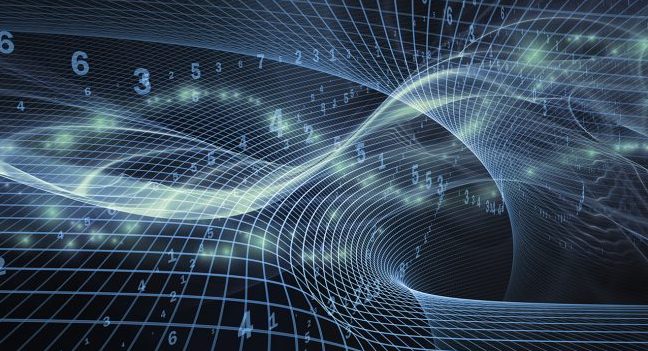
There are many problems with calling God “Source”.
Since the word “source” means “a thing from which something else comes”, the source of our universe could hypothetically be a computer, a mad scientist in a lab, a level in a virtual computer game, a dream in the mind of someone in another universe, an alien from a higher dimension, a quantum fluctuation, or even Satan himself and the word “Source” would not lose its meaning.
The problem with calling God the same thing as Source is that the very definition of “God” implies a supreme being of infinite perfection and maximal greatness, where “Source” doesn’t even imply a being at all. It only refers to a general ‘source’ that is responsible for the universe existing, which as mentioned earlier is totally ambiguous and can apply to a variety of potential sources.
Let’s look at another major difference between the moral nature of “God” as understood in classical theology, and the idea of “Source” that is taught in the New Age:
Moral nature
God: Holy. Perfectly righteous. Pure. To be revered as the Supreme Good. God is the paradigm of moral goodness and is source of morality itself. Any behaviour of ours that contradicts His righteous nature is classified as “sin” or “wrong-action”, and it separates us from God. Sin grieves God. God is perfectly just and therefore rewards the righteousness and punishes wickedness.
Source: Concepts of holiness, righteousness, and moral purity don’t apply to Source. Source is only to be revered in terms of wonder and mystical admiration. It is morally neutral and there is no such thing as sin and righteousness in the eyes of Source. In fact, there are no eyes of Source because it is not watching over us. It’s just an impersonal field. There is no reward for righteousness and no punishment for wickedness because these concepts are simply non-existent within this paradigm.
Their desire for our lives
God: Wants us to spend eternity with Him and wants a loving relationship with us as His children. God wants us to remove everything that prevents us from living holy lives so we can be as close to Him as possible. God wants us to bring our pain and struggles to Him. God has a will and a distinct purpose for each individual soul.
Spirit: Has no desires for us, other than that we experience all things for the sake of experience. It is indifferent to our relationship to it. This field of consciousness doesn’t care how we live or if we “tap into it”. It’s just an impersonal source. It does not respond to our pain and struggles. It has no will or distinct purpose for each life.
As we can see, the concept and nature of God is nowhere near similar to the concept and nature of Source. They are two totally distinct ideas that have almost nothing in relation to one another. The very word “Source” is morally, metaphysically, and theologically empty and only refers to a general cause that produced the universe.
The word “God” implies a being of supreme goodness and maximal greatness, and therefore expresses a totally different concept. Here is a more thorough analysis of God and “Source” as taught in New Age theology and why we should not be calling God “Source”.
5. “God is the universe.”
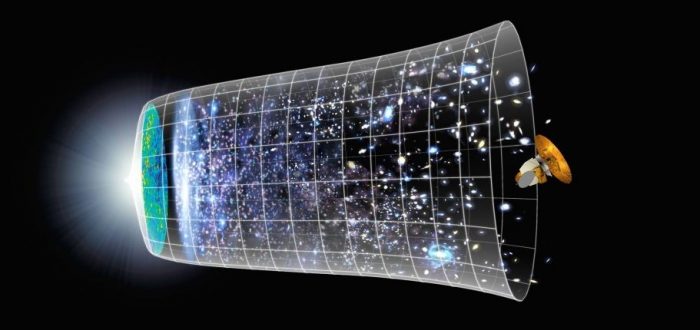
“THE UNIVERSE ITSELF IS GOD AND THE UNIVERSAL OUTPOURING OF ITS SOUL.” – CHRYSIPPUS, CICERO, DE NATURA DEORUM, I. 15
All of our best scientific evidence, from the expansion of the universe to the second law of thermodynamics, tells us that the universe had an absolutely beginning a finite time ago. For example, the fact that the universe is running out of usable energy tells us that it hasn’t existed for an actually infinite amount of time or it would have run out a very long time ago.
According to modern science, roughly 13.4 billion years ago all of space-time reality popped into existence in a single instant known as the Big Bang. According to Stephen Hawking, “almost everyone now believes that the universe, and time itself, had a beginning at the big bang” (2).
Physics professor and Director of the Institute of Cosmology at Tufts University Alexander Vilenkin explains that scientists
“CAN NO LONGER HIDE BEHIND A PAST-ETERNAL UNIVERSE. THERE IS NO ESCAPE, THEY HAVE TO FACE THE PROBLEM OF A COSMIC BEGINNING” (3).
This is uncontroversial and can be found in any textbook on cosmology and astronomy. So here is a question. How can God be the universe itself if there was a time when the universe did not exist? Prior to the Big Bang (if we can even speak about a prior time), our space-time reality and all matter and energy inside it did not exist.
So if we know that the universe began to exist, we also know something beyond the universe must have caused it to exist. This means God MUST be beyond the universe (since there had to be something beyond the universe to bring it into being in the first place), which of course entails that God is not the universe. God cannot be the universe if God must have existed prior to the universe coming into being.
THE BEGINNING OF THE UNIVERSE IS THE SMOKING GUN THAT WE ARE DEALING WITH A TRANSCENDENT BEING THAT EXISTS OUTSIDE OF THE UNIVERSE.
The scientific evidence for the beginning of the universe also tells us that God is not “nature”, since “nature” did not exist at one point. Bluntly put, nature did not create nature. The universe did not create the universe. The universe did not bootstrap itself. It’s a created contingent being with an absolute beginning, and therefore means that God existed without the universe.
Secondly, “God is the universe” can also apply to an atheistic universe. There could be nothing beyond nature and no purpose to existence, just the random activity of particles in motion, and God as defined as being the “universe” would not be impacted a single bit. This definition of God is compatible with atheism, meaning that we are not really talking about a supernatural reality.
6. “God is ‘all that is’, ‘Oneness’, or a collection of all things in creation.”
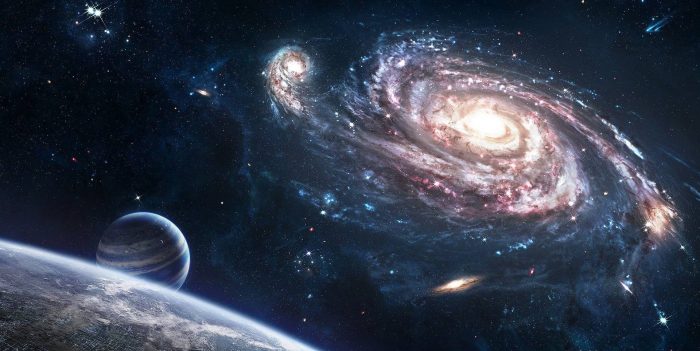
Because we know with a very high level of probability that the universe (and everything in it) began to exist, we can know that God is not “Oneness”, “All, or “Unity” because prior to 13.4 billion years ago there was nothing that existed yet that could be unified or stand in relation to anything else.
This definition of God requires us to believe that God didn’t exist until everything already existed, since God on this view is just a collective totality of all things (seen and unseen) in creation. That would be absurd, because God must have existed outside the creation in order to have brought the creation into existence in the first place.
There was a time when no thing in creation existed. Yet God must have existed prior to creation in order to have created the universe. This means that God is not a collection of things in creation, since there was a time when God existed without the creation.
And since we cannot extrapolate causes into past infinity or posit an infinite number of dimensions or multiverses (for philosophical and scientific reasons we will explore later), we are faced with the fact that what we are dealing with is a transcendent creator of the universe who existed prior to the creation and without the creation who brought all things into existence.
GOD CANNOT BE A COLLECTION OF “EVERYTHING” IF EVERY SINGLE THING IN CREATION BEGAN TO EXIST. GOD MUST BE TRANSCENDENT, EXISTING BEYOND AND OUTSIDE THE CREATION TO HAVE CAUSED THE CREATION TO COME INTO BEING IN THE FIRST PLACE.
This means that God’s existence and identity ultimately stands completely and totally independent from the creation, since God existed timelessly into the eternal past before the universe (and all things in it) came into being. The beginning of the universe demands we consider God’s self-existence as an independent being totally apart from all things in creation.
If God existed without the creation, God’s nature cannot be derived from the creation or the relationship between created things. And also, once again, we run into the question of why call this God? What does this have to do with anything divine or supernatural? This idea of God being a collective totality of all things is compatible with atheism.
7. “God is universal consciousness.”
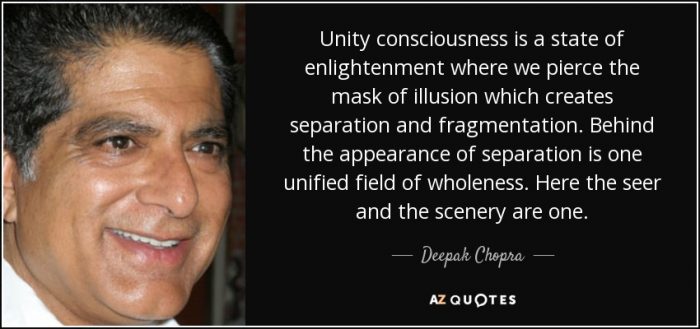
The argument here is that at the basis of nature lies a field of universal consciousness that the particles of creation emerge out of. The belief is that the Superstring field (as discussed in theoretical physics as “String Theory”) is a vibrating sea of energy that is actually composed of the substance of consciousness, and the particles that arise out of the vibrating strings within this field have their source in a universal field of consciousness.
This field is sometimes called the “Source Field”, “Universal Consciousness”, “Atum” in Egyptian traditions and in eastern traditions is called “Brahman”. This view holds that consciousness is a fundamental property to the universe, not an emergent property.
Consciousness is not a product of the brain, the brain is a product of a universal field of consciousness lying at the deepest levels of reality that fluctuates particles in and out of existence and acts as the substance of all creation.
“THE NEW PARADIGM POSITS INSTEAD A MONISM BASED ON THE PRIMACY OF CONSCIOUSNESS – THAT CONSCIOUSNESS (VARIOUSLY CALLED SPIRIT, GOD, GODHEAD, AIN SOF, TAO, BRAHMAN, ETC., IN POPULAR AND SPIRITUAL TRADITIONS), NOT MATTER, IS THE GROUND OF ALL BEING; IT IS A MONISM BASED ON A CONSCIOUSNESS THAT IS UNITIVE AND TRANSCENDENT BUT ONE THAT BECOMES MANY IN SENTIENT BEINGS SUCH AS US.
We are that consciousness. All the world of experience, including matter, is the material manifestation of transcendent forms of consciousness.” – Amit Goswami, Physics of the Soul: The Quantum Book of Living, Dying, Reincarnation, and Immortality
Or as Ph.D. theoretical physicist John Hagelin has said: “The unified field is fundamentally a field of consciousness. The field is known as atman, meaning “pure consciousness,” or “self,” since the unified field constitutes the deepest reality and hence the true identity of everything in nature…
The term “consciousness” is clearly distinguished from the highly individualized and anthropocentric sense of the term common to everyday experience: it is used to denote a completely universal field of “pure, self-interacting” consciousness — consciousness aware of itself alone, devoid of any individualizing influence or external objects of experience…
DUE TO ITS ESSENTIAL NATURE AS CONSCIOUSNESS, MAHARISHI EXPLAINS, THE UNIFIED FIELD HAS THE DUAL CHARACTERISTICS OF EXISTENCE AND INTELLIGENCE.” (5)
God, on this view, is a field of consciousness that lies at the basis of reality and grounds all of being. Aside from the various scientific objections this view is confronted with, let’s grant for the sake of argument that consciousness is really fundamental and universal in the way described.
Let’s grant that there is a field of consciousness that lies at the basis of our universe unifying all of life. A few problems arise.
1. This doesn’t escape the need for a transcendent cause existing beyond the universe.
Even if there is a field of consciousness at the lowest most fundamental levels of nature, there is a major problem present here. The universe (and all its properties) began to exist 13.4 billion years ago. If consciousness was fundamentally built into the universe as a sort of substrata to ground reality, the issue here is that the universe and its properties all began to exist.
Space, time, matter, energy, and universal consciousness may well all be fundamental to our universe. Let’s grant that they are. All these properties, including this fundamental field at the lowest level of nature, began to exist.
Whether consciousness is somehow woven into the fabric of reality at a fundamental level or not is irrelevant to the question of God, because reality itself had an absolutely beginning and we therefore need to look beyond the universe and its properties to an external cause.
This field is an attribute and fundamental property of the universe. It’s the primary substance of the universe. The universe, and all its properties and substances, began to exist. Therefore, this field began to exist. We still need a transcendent first cause to explain the origin of the universe and all its substances/properties, including this field of universal consciousness that is said to lie at the basis of our physical reality.
2. This, at most, only describes the functioning of reality at a natural level.
Even if we grant the existence of a sort of universal field of consciousness that unifies all things at a fundamental level, we are still only describing our space-time universe. This doesn’t lead us to God as a supernatural being. In fact, it doesn’t lead us to anything beyond the natural world. It, at most, leads us to a better understanding of how God, as a supernatural transcendent being, chose to structure the physical universe.
This idea of universal consciousness only addresses how our natural universe is built.
STRING THEORY, OR M THEORY, IS NOT A SUPERNATURAL THEORY. IT ATTEMPTS TO DESCRIBE NATURE. NATURE BEGAN TO EXIST. EVEN IF WE ASCRIBE CONSCIOUSNESS TO THE SUPERSTRING FIELD, WE ARE AT MOST DESCRIBING THE FUNDAMENTAL STRUCTURE OF THE UNIVERSE AT A NATURAL LEVEL.
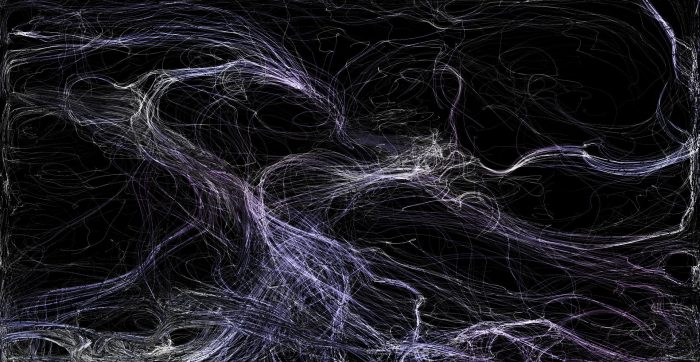
Even John Hagelin Ph.D., a major proponent of this theory of consciousness, says in an interview that this field is “the very core of nature”, and that this field “unites gravity with electromagnetism, with radioactivity, with the nuclear force” as “the most concentrated field of intelligence in nature“.
This theory of universal consciousness was never intended to describe anything beyond nature. It is not a theory of the supernatural. It does not point us to anything transcendent or outside the universe, it only describes the universe at a fundamental level. Even if it exists (which it plausibly doesn’t which we could show in a whole separate article), it’s just a deeper description of the design of creation. Not the creator.
It’s not supernatural, it’s not divine in a literal sense, it’s not past-eternal. It’s just another property of the created universe, just at a sub-plank sub-nuclear level. This idea of “God” is also compatible with an atheistic worldview where nothing beyond the natural world. Consciousness could be a fundamental unifying force at a sub-plank level of nature and this would be perfectly compatible with atheism.
In fact, worldviews such as Buddhism and Jainism are centered around this idea of an impersonal field of consciousness, and they are regarded as being atheistic religions! As a buddhist scholar has said:
“…THE BUDDHA IS AN ATHEIST AND BUDDHISM IN BOTH ITS THERAVADA AND MAHAYANA FORMS IS ATHEISTIC…IN DENYING THAT THE UNIVERSE IS A PRODUCT OF A PERSONAL GOD, WHO CREATES IT IN TIME AND PLANS A CONSUMMATION AT THE END OF TIME, BUDDHISM IS A FORM OF ATHEISM” (4)
So in response to this claim that God is a universal field of consciousness at the heart of creation, we can simply say that this field began to exist (as a property, operation, level, and substance of the creation itself) and does not escape the need for a transcendent cause.
Secondly, it only describes the natural world at a structural level. It does nothing to point us beyond nature to any kind of supernatural reality. At most, even if true, it merely describes a fundamental level of the natural created universe.
In other words, it’s not God.
Summary so far
As we have seen, most of the New Age descriptions of God don’t have anything to do with anything beyond the natural world and are perfectly compatible with an atheism. They are, at most, descriptions of aspects, properties, and qualities of the created universe that are mislabeled as being “God” when they aren’t actually describing a transcendent reality.
We have also see the need that there be a transcendent reality beyond our universe since the universe began to exist. So what is going on here is really just a form of worshiping the creation rather than the creator as it says in Rom. 1:25. The only surviving chance of any kind of idea of God being something operating in nature is if the person says:
“Ok, I see that since nature itself began to exist 13.4 billion years ago, God must be transcendent and exist outside of space and time. I see that these ideas of God are compatible with atheism and are just descriptions of the natural world. I just happen to think God is both transcendent outside the universe AND operating through nature as a universal force of some kind.”
The problem with this is that God must be a personal, transcendent being which completely contradicts the idea of God being an impersonal force in the universe. To say God is personal means that God is a being (not a field) with rationality, self-consciousness, and volition to act upon free will.
If God is personal, this means that Brahman, or an impersonal universal field of consciousness, cannot possibly be the cause of the universe. Here are some reasons why the cause of the universe must be personal.
8. “God is an impersonal force”.
This is where everything here will begin to make sense and come together. As we have seen, most of these ideas about God are really just descriptions of the natural creation that are mistakenly ascribed the term “God”. None of these concepts of God point to anything beyond the universe, which our best science tells us began to exist.
For those who want to hold tightly to any of these ideas (especially the idea of God being Brahman, a universal impersonal force giving rise to creation), we are going to look at three separate arguments for why the creator of the universe MUST be a personal being.
Here is a great video by professional philosopher William Lane Craig going over three reasons why God must be personal, which we sill summarize below:

1. There are only two potential types of causation: scientific or personal, and the universe doesn’t have a scientific cause.
For any given effect, there are only two possible kinds of causes that can explain the effect.
For example, one could ask you the question “Why is the television on?”. One response would be, “because the television is plugged into the outlet in the wall providing an electrical current through the wires to the motherboard, and the power button was engaged causing a wireless signal to the motherboard to turn on and receive the current coming from the electrical outlet”.
This would be a scientific explanation in terms of physical conditions. Or you could say “Because I wanted to watch the game tonight”. This would be an explanation at the level of a personal agent, simply explaining the effect by referring to the free will of a person. Both of these are perfectly valid yet different explanations.
Now when it comes to the beginning of the universe, there was no scientific explanation available because matter, space, time, energy, and the corresponding laws of nature did not exist yet. A scientific explanation requires a prior physical state, but there was no physical state prior to the universe by which we can infer a scientific explanation.
There are no prior physical conditions available, for nothing physical existed yet that could serve as an explanation of the beginning of the universe at a physical level. The only KIND of explanation that remains is an explanation at the level of a personal agent who chose to bring the universe into being.
2. The cause of the universe must be beyond space and time, and therefore immaterial, space-less, formless, unchanging, and uncaused. The only two kinds of entities that fit this descriptions are unembodied minds and abstract numbers.
A cause that transcends the universe must transcend the properties of the universe. This is obvious, for the cause of space could not have already been operating within space. The cause of matter couldn’t have already been material, for there was no existing matter yet by which the cause could be composed.
What this tells us is that we are dealing with a cause beyond matter, space, time, and energy and is therefore immaterial, space-less, timeless, unchanging, and uncaused. These are the properties the first cause of the universe must have, and we can deduce these properties by simply unpacking and analyzing what it would mean for something to be the cause of the universe.
Only two different types of entities we can think of fit these descriptions:
Abstracts objects (such as numbers, sets, etc.), or unembodied minds. Since numbers lack causal powers and can’t cause anything to come into being, it follows that the only entity that could fit such a description is an unembodied mind. Therefore we are within our rational rights to believe the cause of the universe is a personal agent.
3. A personal creator is the only way we can explain the origin of the universe from necessary and sufficient conditions that are permanently and timelessly present.

This may get a little complex but this is the best argument we have for the personal nature of the cause of the universe. Necessary and sufficient conditions refer to the conditions that are required and adequate in order to produce an effect.
Since we know that the cause of the universe must be timeless and eternally existing (since time itself began to exist at the moment of creation), we know that the cause contained all of the conditions permanently and timelessly that are required to produce the universe. This means that all of the necessary and sufficient conditions needed to produce the universe were permanently present within the cause before the universe existed.
But if all the conditions required to cause the universe were timelessly and permanently present, we should expect to see the effect also existing eternally and timelessly. If all the necessary and sufficient conditions needed to produce the universe have always been timelessly and permanently present, we should see an eternally existing universe that has always been present (since all conditions needed to produce it have always been present.)
If all everything needed to produce the effect was always present, why hasn’t the effect always been present? Everything needed to produce the universe has always been within the cause which means the effect should be there for as long as the conditions required to produce it were present.
The beginning of the universe is the origin of a temporal effect with a beginning from a cause which has all of its conditions permanently and timelessly present. How can we explain this?
If everything needed to produce an effect has always been present, we should see observe that the effect has always been present too. But the problem here is, the universe had a beginning! The only way we can explain the creation of the universe with an absolute beginning from a set of permanently present necessary and sufficient conditions is to infer what is caused agent causation.
A personal agent with free will chose to spontaneously create a new effect effect without any prior determining conditions, which is the only we can explain how the universe had an absolute beginning from a permanently and timelessly present set of necessary and sufficient conditions.
If everything needed to produce the universe always existed, we would see a universe that has always existed. Since we don’t see a universe that has always existed, there needs to be an explanation for how a new temporal effect can be brought about out of permanently present sufficient conditions.
The answer is agent causation. God is a free being who has his own will, rationality, and consciousness who made a choice to bring the universe into being from eternity-past simply as an act of free will, which is how we can explain the beginning of the origin of the universe 13.4 billion years ago from permanently and timelessly present necessary/sufficient conditions.
9. Not all religions point to this personal transcendent God.
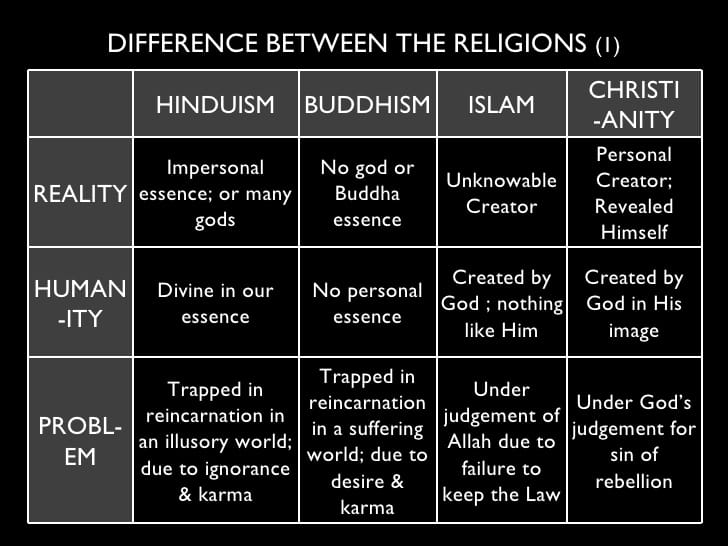
So we have just seen why God is must be a personal, transcendent being who exists beyond the universe. God is not an impersonal force, a universal field, the unity between all things, empty space, or the energy of nature. God is a personal, transcendent being who exists eternally beyond the universe.
Do all religions point to this God in some way? Do all religions ultimately lead us to the same creator who has expressed himself in different ways through various religions? The answer is no. It is impossible for them to all lead to the same God because they all contradict each other on a fundamental structural level.
For example, in Christianity Jesus died on the cross for the sins of the world and rose from the grave so that we can be reconciled back to God through faith in him. Jesus is the onlyway back to the Father, because he is the only solution to the dilemma of human sin:
1Cor-15-3
“CHRIST DIED FOR OUR SINS IN ACCORDANCE WITH THE SCRIPTURES,THAT HE WAS BURIED, THAT HE WAS RAISED ON THE THIRD DAY IN ACCORDANCE WITH THE SCRIPTURES,” – 1 Cor 15.3-4
The truth of the Christian faith rests upon Jesus dying on the cross and being resurrected on the third day. The Quran teaches that:
“THAT THEY SAID (IN BOAST): ‘WE KILLED CHRIST JESUS THE SON OF MARY, THE MESSENGER OF ALLAH.’ BUT THEY KILLED HIM NOT, NOR CRUCIFIED HIM, BUT SO IT WAS MADE TO APPEAR TO THEM, AND THOSE WHO DIFFER THEREIN ARE FULL OF DOUBTS, WITH NO (CERTAIN) KNOWLEDGE, BUT ONLY CONJUNCTION TO FOLLOW, FOR OF A SURETY THEY KILLED HIM NOT.” – QURAN 4:156-158
Jesus either died on the cross for our sins so to lead us to God, or he didn’t. If he did, Christianity is true. If he didn’t, maybe Islam or some other religion is true. But Islam and Christianity can’t both lead us to God if they contradict each other in telling us how to get there.
The differences between Buddhism and Christianity are even more extreme where there is no personal God, Saviour, or concept of sin in Buddism, all of which are absolutely central to the Christian faith. Here is a more thorough article going through the differences between the major world religions, and why pointing to similar moral virtues is not enough to establish that they all lead back to God.
10. “God is mysterious, mystical, and unknowable.”

God is a personal being who loves you in a personal way. You can know Him personally and have a direct relationship with Him. Meditation, psychedelics, chanting, contemplation, intelligence, or special esoteric knowledge has no bearing on your relationship with God because God is an approachable person.
If I was sitting across from you and wanted to get to know you, I would speak to you and address you as a person. I would not try to alter my consciousness, brainwaves, or enter into a state of self-transcendence in order to communicate to you. Likewise, God doesn’t require any of these things from us. In fact, these things lead us farther away from God by perverting the simplicity of who He is.
As we are exploring on this site, God has revealed Himself in the person of Jesus who claimed to be the only path to God (John 14:6, John 3:16) who died for our sins (Rom. 4:25), was raised on the third day (1 Cor. 15:4), and through faith and faith alone (Eph 2:8-9) we are made righteous (Rom. 3:22) and reconciled back to God (2 Cor. 5:18) from who we were separated from because of sin (Isaiah 59:2).
And we have a whole wealth of evidence to back this up, which we are exploring on this site. We have seen evidence for a personal God in this article, and when we combine this with the arguments of natural theology, the evidence for the resurrection and other evidences of Jesus’ divinity, we have a cumulative case for Christianity.
But most importantly, we can come to know this in a personal intimate way through the inner witness of the Holy Spirit, the personal presence of the Lord who bears Himself in our spirits when we believe on Jesus in our hearts.
This inner personal presence is a self-authenticating self-verifying spirit who confirms to us that Jesus Christ is Lord. Through Jesus, we have direct access to God because our sin is no longer keeping us severed from his presence. And this is the wonderful, amazing, and simple truth of the cross.
That we are loved and known by a personal God who sent Jesus to be sacrificed and judged on our behalf so that we could come into relationship with God and spend eternity with Him. He is a Heavenly Father who loves you, cares for you, and wants you to know Him intimately.
References
1. Tolle, E. 2005. A New Earth: Awakening To Your Life’s Purpose. p. 267
2. Hawking, S. 1996. The Nature of Space and Time. p. 20.
3. Vilenkin, A. 2006. Many Worlds in One. p.176.
4. Jayatilleke, K. 1974. The Message of the Buddha. p. 105.
5. Hagelin, J. 1989. Restructuring Physics from its Foundations in Light of Maharishi Vedic Science.


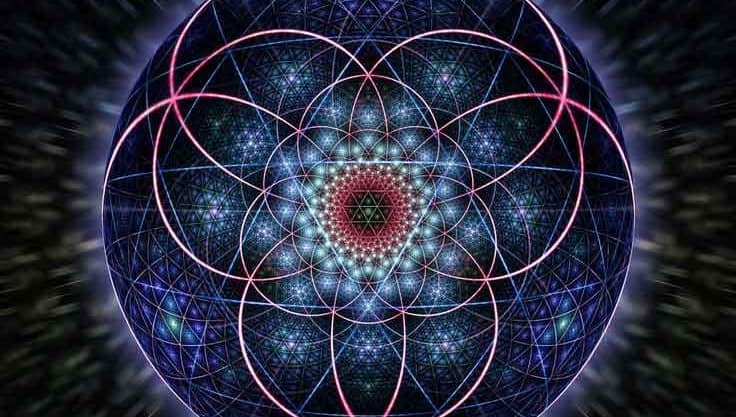





![STARS, WARS, BLOOD & LUST… [The “royal secrets” of the Djedi knights of Scientism]](https://christianobserver.net/wp-content/uploads/2023/11/star-wars-blood-lust-150x150.jpg)

